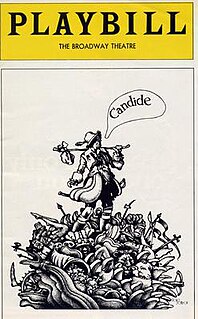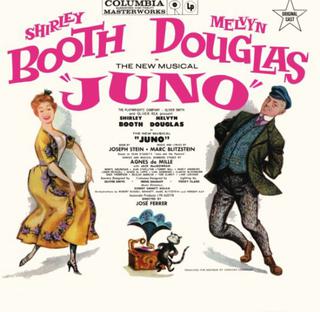
The Threepenny Opera is a "play with music" by Bertolt Brecht, adapted from a translation by Elisabeth Hauptmann of John Gay's 18th-century English ballad opera, The Beggar's Opera, and four ballads by François Villon, with music by Kurt Weill. Although there is debate as to how much, if any, Hauptmann might have contributed to the text, Brecht is usually listed as sole author.

The Little Foxes is a 1939 play by Lillian Hellman, considered a classic of 20th century drama. Its title comes from Chapter 2, Verse 15 of the Song of Solomon in the King James version of the Bible, which reads, "Take us the foxes, the little foxes, that spoil the vines: for our vines have tender grapes." Set in a small town in Alabama in 1900, it focuses on the struggle for control of a family business. Tallulah Bankhead starred in the original production as Regina Hubbard Giddens.

Porgy and Bess is an English-language opera by American composer George Gershwin, with a libretto written by author DuBose Heyward and lyricist Ira Gershwin. It was adapted from Dorothy Heyward and DuBose Heyward's play Porgy, itself an adaptation of DuBose Heyward's 1925 novel of the same name.
"Mack the Knife" or "The Ballad of Mack the Knife" is a song composed by Kurt Weill with lyrics by Bertolt Brecht for their 1928 music drama The Threepenny Opera. The song has become a popular standard recorded by many artists, including a US and UK number one hit for Bobby Darin in 1959.

Marcus Samuel Blitzstein, was an American composer, lyricist, and librettist. He won national attention in 1937 when his pro-union musical The Cradle Will Rock, directed by Orson Welles, was shut down by the Works Progress Administration. He is known for The Cradle Will Rock and for his off-Broadway translation/adaptation of The Threepenny Opera by Bertolt Brecht and Kurt Weill. His works also include the opera Regina, an adaptation of Lillian Hellman's play The Little Foxes; the Broadway musical Juno, based on Seán O'Casey's play Juno and the Paycock; and No for an Answer. He completed translation/adaptations of Brecht's and Weill's musical play Rise and Fall of the City of Mahagonny and of Brecht's play Mother Courage and Her Children with music by Paul Dessau. Blitzstein also composed music for films, such as Surf and Seaweed (1931) and The Spanish Earth (1937), and he contributed two songs to the original 1960 production of Hellman's play Toys in the Attic.

Bye Bye Birdie is a stage musical with music by Charles Strouse and lyrics by Lee Adams, based upon a book by Michael Stewart.

The Cradle Will Rock is a 1937 play in music by Marc Blitzstein. Originally a part of the Federal Theatre Project, it was directed by Orson Welles and produced by John Houseman. A Brechtian allegory of corruption and corporate greed, it includes a panoply of social figures. Set in "Steeltown, USA", it follows the efforts of Larry Foreman to unionize the town's workers and combat wicked, greedy businessman Mr. Mister, who controls the town's factory, press, church and social organization. The piece is almost entirely sung-through, giving it many operatic qualities, although Blitzstein included popular song styles of the time.

Candide is an operetta with music composed by Leonard Bernstein, based on the 1759 novella of the same name by Voltaire. The operetta was first performed in 1956 with a libretto by Lillian Hellman; but since 1974 it has been generally performed with a book by Hugh Wheeler which is more faithful to Voltaire's novel. The primary lyricist was the poet Richard Wilbur. Other contributors to the text were John Latouche, Dorothy Parker, Lillian Hellman, Stephen Sondheim, John Mauceri, John Wells, and Bernstein himself. Maurice Peress and Hershy Kay contributed orchestrations. Although unsuccessful at its premiere, Candide has now overcome the unenthusiastic reaction of early audiences and critics and achieved more popularity.

Marc Kudisch is an American stage actor, who is best known for his musical theatre roles on Broadway.

Juno is a musical with music and lyrics by Marc Blitzstein and book by Joseph Stein, based closely on the 1924 play Juno and the Paycock by Seán O'Casey. The story centers on the disintegration of an Irish family in Dublin in the early 1920s, during the Irish War of Independence. Juno is a hardworking matriarch who strives to hold her family together in the face of war, betrayal, and her worthless husband's drinking.

John Francis Mauceri is an American conductor, producer, educator and writer. Since making his professional conducting debut almost half a century ago, Mauceri has appeared with most of the world's great orchestras, guest conducted at the premiere opera houses, produced and musically supervised Tony and Olivier Award-winning Broadway musicals, and served as university faculty and administrator. Through his varied career, he has taken the lead in the preservation and performance of many genres of music and has supervised/conducted important premieres by composers as diverse as Debussy, Stockhausen, Korngold, Hindemith, Bernstein, Sibelius, Ives, Elfman, and Shore. He is also a leading performer of music banned by the Third Reich and especially music of Hollywood's émigré composers.
Porgy and Bess, the opera by George Gershwin, has been recorded by a variety of artists since it was completed in 1935, including renditions by jazz instrumentalists and vocalists, in addition to operatic treatments.
Katherine Ciesinski is an American mezzo-soprano, stage director, and voice professor.
Des Moines Metro Opera (DMMO) is an opera company based in Indianola, Iowa, a town of approximately 14,000, located 12 miles south of Des Moines, Iowa. DMMO was founded by Dr. Robert L. Larsen and Douglas Duncan in 1973.

Another Part of the Forest is a 1946 play by Lillian Hellman, a prequel to her 1939 drama The Little Foxes.
Michael Pollock was an American operatic tenor, opera director, and voice teacher. He notably worked as both a performer and director at the New York City Opera during the 1940s and 1950s.

Loren Driscoll was an American tenor who had an active international career from the 1950s through the mid-1980s. Driscoll was particularly noted for his performances in contemporary operas and sang in many world premieres.
Brenda Lewis was an American operatic soprano, musical theatre actress, opera director, and music educator. She enjoyed a 20-year-long collaboration with the New York City Opera (NYCO) with whom she notably created roles in several world premieres by American composers; including the title role in Jack Beeson's Lizzie Borden in 1965. She also performed with frequency at the Metropolitan Opera from 1952 to 1965, and was active as a guest artist with notable opera companies both nationally and internationally. Although she is mainly remembered as an exponent of American operas and musicals, she performed a broad repertoire of works and was particularly celebrated for her portrayals of Marie in Wozzeck, Rosalinde in Die Fledermaus, and the title roles of Carmen and Salome; the latter of which she performed for the inauguration of the Houston Grand Opera in 1956.
Elisabeth Carron, was an American operatic soprano from Newark, New Jersey, who had an active international career from the 1940s through the 1980s. In 1954 she portrayed the Young Woman in the world premiere of Gian Carlo Menotti's The Saint of Bleecker Street. From 1988 to 1996 she taught on the voice faculty at the Manhattan School of Music in New York.
Sacco and Vanzetti is a 2001 opera by Marc Blitzstein and Leonard Lehrman.